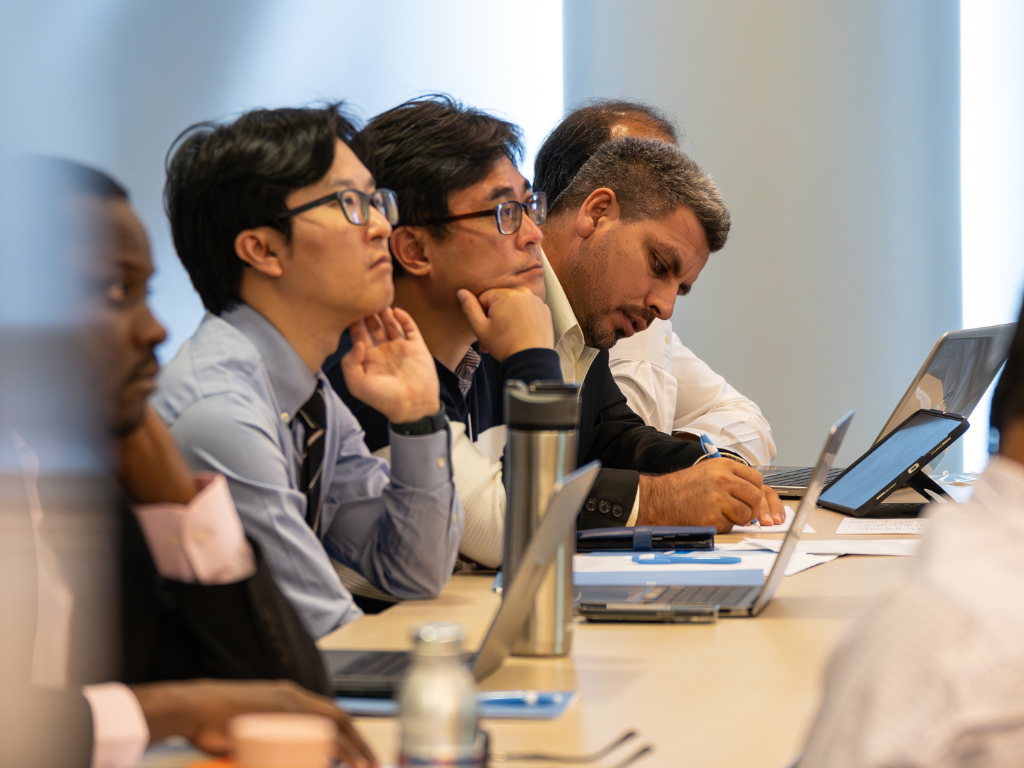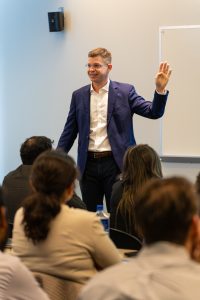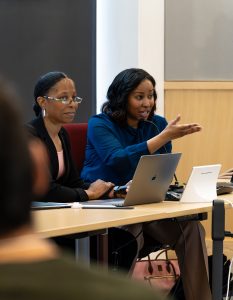UNC hosts workshop for global fellows on generative artificial intelligence
March 25, 2024UNC Global Affairs
 Humphrey Fellows participate in generative AI workshop at Carolina.
Humphrey Fellows participate in generative AI workshop at Carolina.
Fulbright Humphrey Fellowship brings the world to Carolina
Carolina’s School of Data Science and Society (SDSS), in partnership with the Office of the Vice Provost for Global Affairs (OVPGA), organized the Fulbright Humphrey Fellowship Enhancement Workshop that took place over the university’s spring break. The week-long experience brought together 28 professionals — rising leaders across many fields — and from 24 different countries to learn about generative artificial intelligence (AI).
“This workshop put Carolina on the map for understanding and innovating around generative AI,” Jocelyn Tsai, SDSS research project manager, said. “The fellows learned so much from the presentations and discussions.”
Presentations by UNC-Chapel Hill faculty experts focused on the history, applications, ethical implications and prevalence of the emerging technology.

“At the heart of this workshop is the fusion of diverse minds and global perspectives, all converging on the transformative power of generative AI,” Daniel Ringel, assistant professor of marketing at Carolina, said. “It’s about shaping a future where technology elevates society and business at an extraordinary pace.”
Ringel and Jack Snoeyink, a computer science and SDSS professor at Carolina, co-directed the workshop and facilitated several presentations, as did six other Carolina faculty. Humphrey Fellows also visited North Carolina Central University (NCCU) to discuss the societal impacts of generative AI with Siobahn Day Grady, assistant professor and director of the Laboratory for Artificial Intelligence and Equity Research (LAIER), and April G. Dawson, associate dean of technology and innovation and professor of law.
“The experience at NCCU showed me, as a software engineer, that we don’t always think about how our work is affecting other people,” Humphrey Fellow Habone Mohamed Said stated. “Software engineering is an art. We think about improving others’ lives, but we often don’t realize how our work can negatively affect people, too.”
Mohamed Said is a software engineer in Djibouti, but not all participants had experience in computing. SDSS designed workshops for professionals in any field. Yudi Viviana Quintero Salgado is a psychologist from Colombia who works to prevent child online sexual abuse and exploitation.
“AI is one of the tools used by aggressors and perpetrators to produce sexual abuse material,” she said. “I am part of a group of people developing an AI tool which, instead, will prevent abuse. This workshop has allowed me to understand better how public policy professionals can work among stakeholder groups to direct the future of AI for the common good.”

International academic and professional exchange programs like the Fulbright Humphrey Fellowship Enhancement Workshop help achieve the university’s strategic goal of “bringing the world to Carolina,” and strengthen UNC-Chapel Hill’s reputation for excellence around the world. For SDSS, the workshop advanced the new school’s goal of developing innovative ways to use foundational and translational data science for the public good.
“Data science is a priority at Carolina and SDSS is serving as a driver for innovation in the field,” Stan Ahalt, dean of SDSS, said. “We look forward to working with these fellows this week and will count them as a part of our wider University community in the years to come.”
The Humphrey Fellowship Program is a Fulbright exchange initiative funded by the U.S. Department of State and administered by the Institute of International Education (IIE). It seeks to cultivate leadership skills among international professionals, encourage collaboration to tackle local and global challenges and promote positive collective change. The development of generative AI has created many challenges — and opportunities for positive change — making it an ideal topic for this program.
“By empowering Humphrey Fellows with the knowledge of generative AI, we’re sending a powerful message from Carolina,” Ringel said. “We’re proving that generative AI impacts everyone, and together, we can harness it to build a better world for the people, by the people.”
